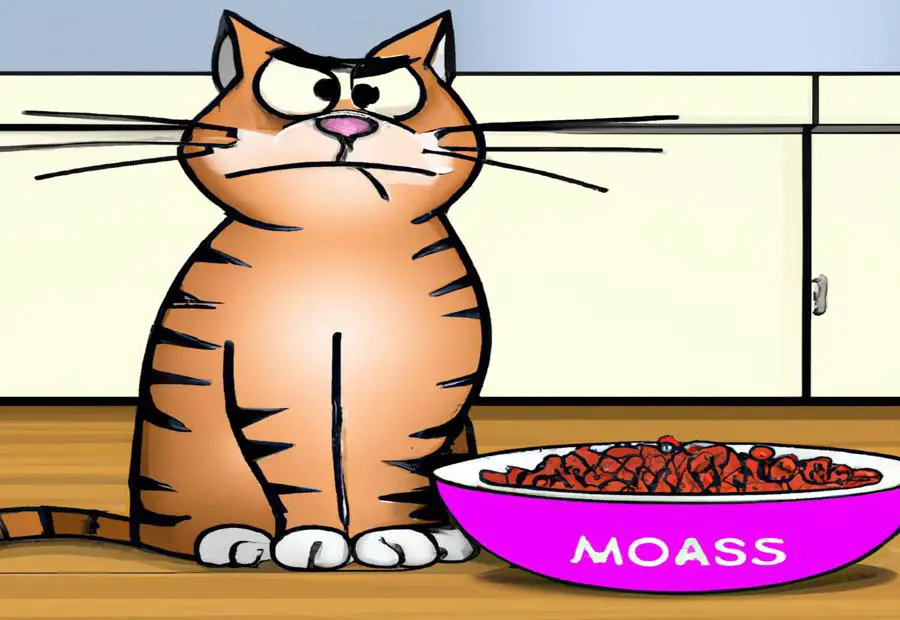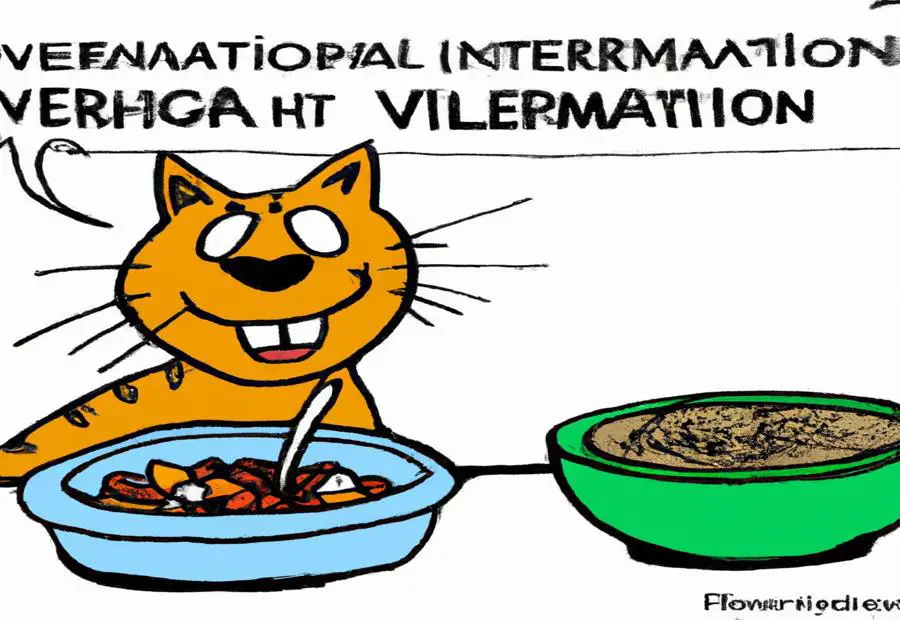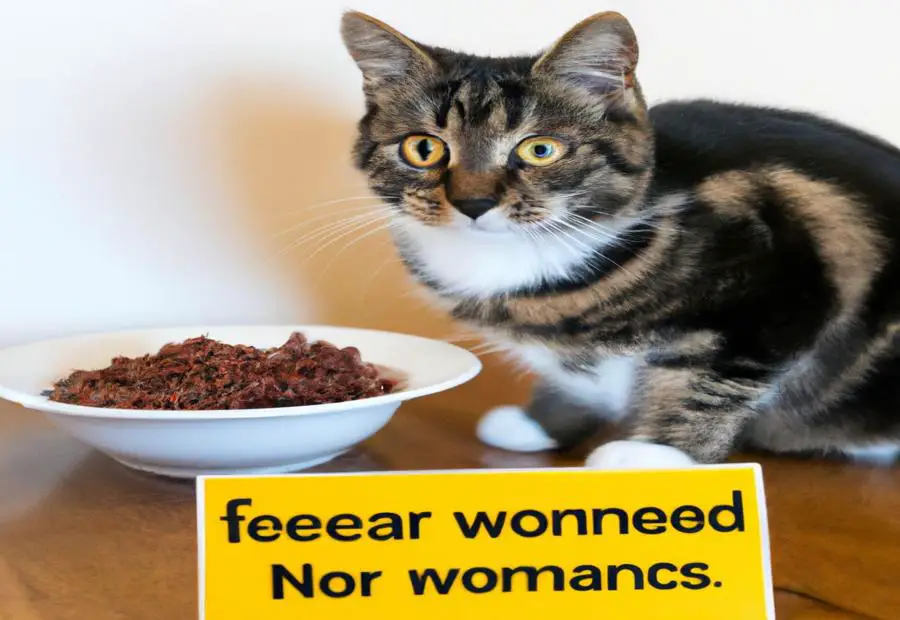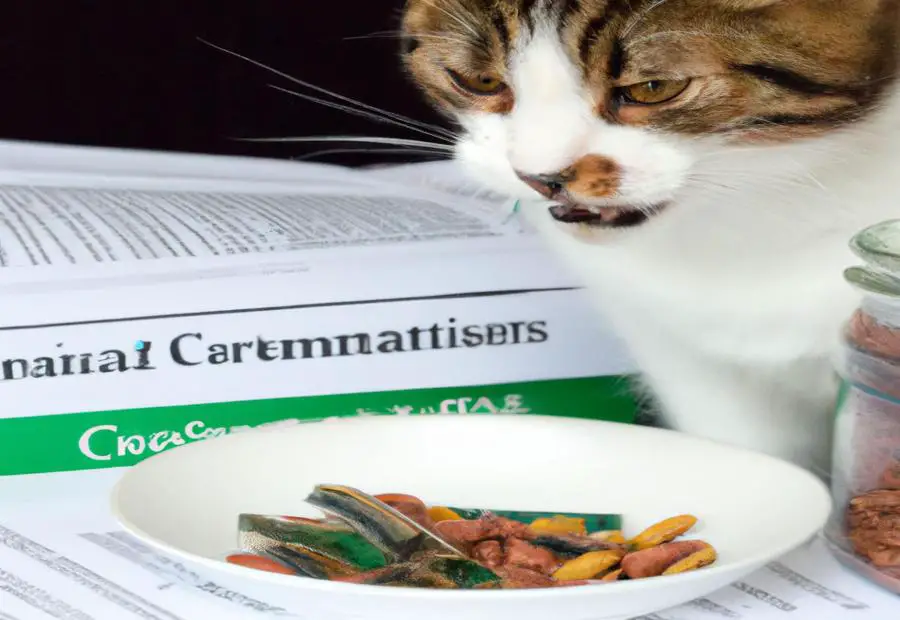.jpg)
Key Takeaways:
- Cats may enjoy mealworms due to their hunting instincts, but it is important to feed them as an occasional snack rather than a meal replacement.
- Mealworms can be a high-quality protein source for cats, providing nutritional benefits.
- Care should be taken to avoid parasites, infections, and other insects that may harm cats. It is essential to monitor for signs of poisoning and consult a veterinarian for specific dietary concerns.
Introduction

Photo Credits: Petbrilliant.Com by Eugene Adams
Mealworms are a yummy treat for cats. But, before you give them to your cat, consider a few things.
Mealworms are full of protein and good fats which can help keep cats healthy. But they can also cause problems if cats have allergies or sensitivities. So, check with your vet first.
Also, make sure the mealworms are good quality and free from pesticides. Don’t give them to your cat as the only food. Add them as a treat or supplement, not as a meal replacement. This way, your cat will get a balanced diet.
In summary, mealworms can be a healthy addition to your cat’s diet. Just be aware of any potential allergies or sensitivities they may have and always talk to your vet before introducing them. With the right precautions, your cat can enjoy a varied and balanced diet without any worries.
Nutritional value of mealworms for cats

Photo Credits: Petbrilliant.Com by Jack Smith
Mealworms may be more than just a tasty treat for cats. Delving into the nutritional value of mealworms, this section explores their appeal to cats and their innate hunting instincts. We will also discuss how mealworms serve as a high-quality protein source for our feline friends. However, it is important to note that mealworms should only be given to cats as an occasional snack rather than a meal replacement.
Cats’ love for mealworms and their hunting instincts
Text:
Cats’ hunting instincts lead them to crave mealworms. These tiny creatures provide protein-packed nutrients that cats can’t resist. Mealworms contain all the essential amino acids needed for cats’ health. Plus, they offer vital vitamins and minerals. While mealworms are great as a snack, they shouldn’t be the only source of nutrition. A balanced diet is key for cats’ wellbeing. If feeding cats mealworms, take precautions; there’s risk of parasites and infections. Monitor and observe your cat closely. If signs of poisoning or unusual behavior occur, get veterinary help fast.
Mealworms as a high-quality protein source for cats
Mealworms are a great source of protein for cats. They satisfy their natural hunting instinct while providing essential amino acids for their overall health.
These insects are packed with protein, which cats need for muscle growth, tissue repair, and development. Plus, the protein in mealworms is easily digestible for cats.
Pet owners can use mealworms as a natural alternative to meat-based diets and commercial pet foods. Just remember to give them as an occasional snack and not a full meal.
When feeding mealworms to cats, it’s important to supervise them. This ensures they consume them safely and don’t overindulge. Also, avoid other insects that may cause harm to your cat.
Mealworms are like the side dish at a fancy dinner party for your feline friend; they shouldn’t be the main course. Consulting a veterinarian is recommended before introducing any new food into your cat’s diet.
Mealworms as an occasional snack and not a meal replacement
Cats have a fondness for mealworms and natural hunting instincts. This makes them a great occasional snack instead of a full meal. Mealworms offer high-quality protein which cats need. However, they should be fed in limited amounts to maintain a balanced diet.
Mealworms give cats important nutrients like vitamins, minerals, and amino acids. But, they should only be fed as a treat, not a regular or exclusive source of nutrition. Cats need a variety of proteins, fats, and carbohydrates to stay healthy.
Letting cats hunt mealworms as a treat can give them mental stimulation. This is because hunting is in their nature. It also adds variety to their diet. Nevertheless, you should watch cats closely when feeding them to avoid overeating and choking.
It’s important to get mealworms from reliable suppliers. Avoid other insects as they may have parasites or infections that could harm your cat. If your cat vomits or has diarrhea after eating insects, don’t ignore it. Consult with a vet if any reactions occur, or if you have concerns about your cat’s diet.
Potential risks and precautions

Photo Credits: Petbrilliant.Com by Gabriel Walker
When it comes to feeding mealworms to your beloved feline companions, it’s crucial to be aware of the potential risks and precautions. In this section, we’ll explore the various parasites, infections, and other insects that may pose a threat to cats. Moreover, we’ll discuss the signs of poisoning and provide important guidelines on what actions to take in such situations. Stay informed to ensure your cat’s well-being!
Parasites and infections that may affect cats
Cats may be at risk of certain parasites and infections if they consume mealworms, such as tapeworm larvae, roundworms, hookworms, salmonella, and E. coli. But, proper precautions can reduce these risks. Feeding mealworms as an occasional treat instead of a regular part of the diet can help. Also, make sure the mealworm source is reputable and stored correctly.
It’s important for cat owners to know the potential dangers of feeding mealworms to their pets. Monitor cats after consuming mealworms for signs of illness or reactions. If any symptoms appear, like vomiting, diarrhea, or lethargy, seek veterinary attention right away.
Other insects that should be avoided
Cats are hunters by nature and they love mealworms. But, other insects can be dangerous. Such as:
- Flies – they carry diseases and parasites that can affect cats.
- Bees and Wasps – they can sting, causing allergic reactions.
- Spiders – some may be venomous, which can hurt or even kill cats.
- Cockroaches – they carry bacteria which can make cats sick.
- Fleas – while not technically insects, they can transmit diseases.
Mealworms are good for cats. But, it’s important to check for any risks with other insects. Signs of poisoning in cats should be watched out for. If anything unusual is noticed, consult a vet!
Signs of poisoning and what to do
Cats are curious creatures and may come into contact with substances that can be poisonous. It is important to know the signs of poisoning and what to do if your cat shows any symptoms.
- Changes in behavior: Lethargy, withdrawal, or aggression may be a sign of poisoning.
- Vomiting or diarrhea: These are common symptoms. Seek veterinary attention if your cat experiences them frequently.
- Loss of appetite: A sudden lack of interest in food can mean something is wrong. It could be poisoning or another health issue.
- Breathing or coughing difficulty: Ingestion of certain toxins can affect the respiratory system. If your cat is having trouble breathing or coughing persistently, it may be an indication of poisoning.
Act quickly if you suspect your cat has been poisoned. Seek immediate vet assistance. Don’t give your cat any home remedies or over-the-counter medications without guidance from a vet. Some human medications can be toxic to cats and worsen the situation.
Mealworms can be a gourmet snack for cats. However, exercise caution and monitor your cat’s well-being after they eat them. Look out for any unusual symptoms to ensure early detection and proper treatment if any adverse reactions occur.
Conclusion

Photo Credits: Petbrilliant.Com by Arthur Taylor
When it comes to mealworms and cats, the conclusion is clear. We will delve into the safety and nutritional value of mealworms as an occasional treat for our feline friends. However, it is essential to exercise caution and supervise their consumption. If you have specific dietary concerns regarding your cat, it’s always wise to consult with a knowledgeable veterinarian.
Mealworms can be a safe and nutritious occasional treat for cats
Mealworms can be a safe treat for cats. They love them! And these small insects are filled with high-quality proteins. It’s important to give them in moderation. Not as a replacement for meals.
Mealworms can help cats in many ways. Muscles, immune system, skin and coat. But only from reliable sources that are free from potential contaminants.
Avoid other insects that could pose harm or toxicity risks. They may contain bad substances or cause allergies. Mealworms are known to be safe.
Be aware of signs of poisoning. Vomiting, lethargy, diarrhea, and changes in behavior. If you see these after consuming mealworms, get vet attention.
Also, keep an eye on your cat. They can be sneaky snack thieves!
Supervision and caution are necessary when feeding mealworms to cats
Cats can get many nutritional benefits from mealworms – but caution is needed when feeding them to feline pets. The strong hunting instincts of cats make mealworms appealing. They are a great source of high-quality protein, though only as a snack and not a main diet.
Supervision and caution are key when feeding mealworms to cats, as parasites and infections can be passed on. Health monitoring must be done to detect any problems. Also, other insects that could be toxic should be avoided. If signs of poisoning appear, seek veterinary help quickly.
When introducing mealworms into a cat’s diet, consulting a vet is essential. Get personalized advice for the cat’s age, health and specific dietary needs.
Mealworms can be safe and healthy for cats, but always practice caution and supervision. It is important to get professional guidance when adding any new food item to their diet.
Consultation with a veterinarian is recommended for specific dietary concerns
Consulting a vet is essential when adding mealworms to a cat’s diet. A vet can give personalized advice for the kitty’s individual needs. They can assess the cat’s overall diet and see if mealworms fit the nutritional requirements. Consulting a vet ensures owners make the right decisions about their cat’s diet.
It’s vital to get a vet’s opinion when feeding cats mealworms. Each cat has different dietary needs. Vets can provide tailored advice based on the cat’s age, weight, health, and any food allergies. This way, owners can identify potential risks or allergic reactions.
Consulting a vet is key if a cat has dietary issues. The vet can decide if mealworms are suitable and recommend portion sizes. They can track the cat’s reaction to mealworms over time and make any necessary adjustments.
Some Facts About “Are Mealworms Bad for Cats”:
- ✅ Mealworms can be a good source of protein for cats. (Source: Hepper.com)
- ✅ Cats should not rely on mealworms as a replacement for their regular diet. (Source: ExcitedCats.com)
- ✅ Mealworms should come from a reliable source to ensure they are safe for cats to eat. (Source: PetFoodIndustry.com)
- ✅ Cats should not consume live mealworms, as they can carry parasites. (Source: SmallPetSite.com)
- ✅ Eating mealworms as an occasional treat is safe for cats, but they should not be the sole source of nutrition. (Source: PetsGal.com)
FAQs about Are Mealworms Bad For Cats
Are mealworms safe for cats to eat?
Answer: Yes, mealworms can be safely fed to cats as they are a good source of protein. However, it’s important to source them from a reputable store to ensure they are free from parasites.
Can cats eat wild mealworms?
Answer: It is not recommended for cats to eat wild mealworms as they can carry dangerous parasites. It is safer to feed them farm-raised mealworms sourced from a reliable source.
Should cats be fed mealworms in limited quantities?
Answer: Yes, cats should only be given mealworms as an occasional treat and not as a replacement for their regular diet. Mealworms do not provide all the necessary nutrients for a balanced cat diet.
Do mealworms contain a high amount of protein?
Answer: Yes, mealworms are a protein-rich food source that can be beneficial for a cat’s health. They are high in crude protein, which is important for cats as obligate carnivores.
What are some alternatives to feeding cats mealworms?
Answer: If you prefer not to feed your cat mealworms, you can consider offering them other insects such as crickets or grasshoppers. However, these should also be given in limited quantities and not as a regular part of their diet.
How can I keep my cat away from mealworms?
Answer: To keep your cat away from mealworms, you can try using wire netting or other cat deterrent inventions. Additionally, placing prickly shrubs or brambley cuttings near the mealworms can help prevent cats from accessing them.
